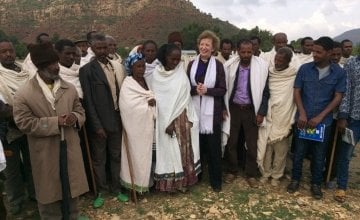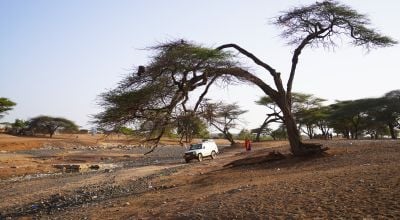
Read our 2023 annual report

Knowledge Hub
Crop failure puts millions at risk in Ethiopia and beyond

The issue of climate change and the extent to which it is caused by humans has been subject to high profile controversy in the media over the years. No matter where you sit in relation to this issue, however, there are certain facts that can’t be denied.
Unpredictable weather phenomena are causing chaos in agricultural cycles in parts of the world. Extreme droughts and floods are having a devastating impact on food production, and to communities who are largely dependent on subsistence farming, this is proving catastrophic.
El Niño effect disrupting food production
El Niño, which occurs every two to seven years, leads to an increase in temperature of waters the central and eastern Pacific Ocean. While this is a natural phenomenon, studies suggest that its recurrence is becoming more frequent and intense as a result of climate change. The upshot is, certain parts of Africa, Latin America, the Pacific and Asia have been experiencing extreme weather events in the last year – including droughts and flooding – which are having a huge impact on food production and farming.
Over 60 million people are now affected by droughts attributed to the El Niño effect. The majority of those – approximately 50 million – are in east and southern Africa.
Impact on Ethiopia
Ethiopia is heavily reliant on agriculture: 85 percent of Ethiopians rely on subsistence farming; and 95 percent of the country’s agricultural production takes place on small family holdings of one hectare or less. Agriculture accounts for more than half the country’s GDP and as much as 90 percent of exports and employment. The failure of the last two rainy seasons and the subsequent drought, have severely affected food production – and the consequences are dire.
While the Ethiopian government has significantly invested in resilience and adaptation schemes to mitigate against the effects of this drought, the sheer scale of the crisis has overwhelmed its ability to effectively respond without external assistance. There is currently a €628 million shortfall in the funding necessary to adequately meet the needs of the 10.2 million people affected by this crisis.
Concern’s work in Ethiopia
Concern has worked in Ethiopia since 1973 in the areas of emergency response, resilience building and sustainable development targeting the poorest communities living in chronically food insecure areas of the country.
We are currently working with the Ethiopian government and international partners to respond to the drought. We have scaled-up our response from 10 to 32 of the most affected woredas (districts) in Amhara, Tigray and SNNPR, as well as providing ongoing support to refugees in Gambella. This work includes providing nutrition services for 250,000 children and pregnant or breastfeeding mothers at 560 health posts and 113 health centres.
We are providing access to safe drinking water to over 40,000 people by trucking in water and rehabilitating boreholes. We are providing soap, water treatment and mass public campaigns to help improve health and hygiene, and prevent and manage scabies outbreaks. We are also supporting 30,000 drought-affected farms with seeds for early agricultural recovery.
You can help
If you’d like to support our work in Ethiopia, you can donate at the link below.





